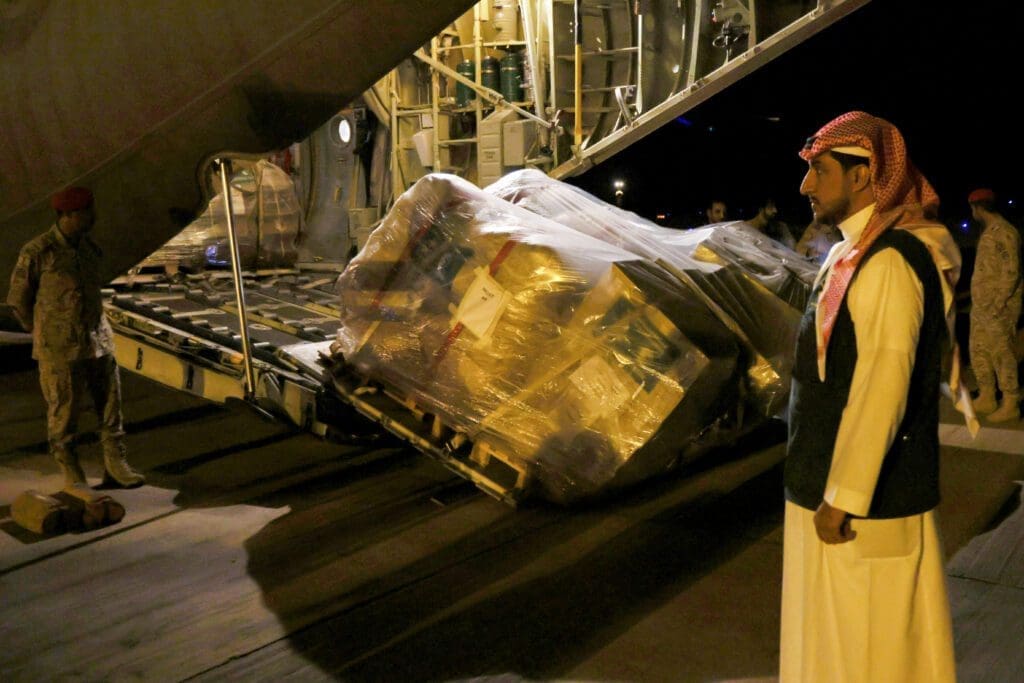As Sudan’s two main armed forces battle for control of Khartoum, hopes for a truce may lie on the other side of the Red Sea. Saudi Arabia has been holding talks in Jeddah reportedly focused on reaching a ceasefire and ensuring aid can reach those affected by the fighting, which has already killed hundreds of Sudanese and displaced more than 700,000. While these goals are limited, Riyadh’s efforts to end the fighting reflect broader strategic worries about its coastal neighbor’s stability—concerns shared by another Gulf country, the United Arab Emirates.
Strategic competition in the Horn of Africa drew both Riyadh and Abu Dhabi into boosting their involvement in Sudan well before dictator Omar al-Bashir was overthrown in 2019. Three years earlier, al-Bashir had ended a close alliance with Saudi Arabia’s arch-rival Iran and sent troops to join the Saudi-led coalition battling pro-Iranian Houthi rebels in Yemen. In exchange, Saudi Arabia and the UAE pumped investment into Sudan, and the UAE successfully lobbied Washington to ease sanctions imposed decades earlier over Khartoum’s links to Al-Qaeda and continued over rights abuses in Darfur.
But Riyadh and Abu Dhabi’s concerns were not limited to Iranian influence. They also sought to pry al-Bashir away from Qatar and Türkiye, believing that political Islamist groups empowered by those countries after the Arab Spring, including forces al-Bashir had backed in Libya, posed a threat to their own regimes. Saudi Arabia was also unnerved by Sudan’s lease of a Red Sea island to Türkiye.
All this meant that when al-Bashir was ousted following mass protests in 2019, Saudi Arabia and the UAE were quick to respond. Within days, they pledged to send Khartoum $3 billion in aid, including food, fuels, and cash for the central bank. They have continued to build major economic and strategic interests in Sudan—interests they now want to protect.
Fighters, Ports, and Gold
Today’s conflict centers on the rivalry between two generals, army chief Abdel Fattah al-Burhan and the Rapid Support Forces’ (RSF) commander Mohammed Hamdan Dagalo, widely known as Hemedti. Both have ties with Riyadh and Abu Dhabi, which have each in turn made use of Sudanese fighters in their own regional conflicts.
Saudi Arabia drew on both RSF forces and regular Sudanese soldiers to back its war in Yemen, with an estimated 40,000 Sudanese fighting there even before al-Bashir’s overthrow. The UAE has employed RSF forces to back military strongman Khalifa Haftar in Libya, where the group sent at least a thousand gunmen to back his failed attempt to seize Tripoli in 2019.
Besides these ties, the warring parties have personal connections to senior officials in Riyadh and Abu Dhabi. Al-Bashir-era Sudanese Chief of Staff and intelligence officer General Taha Osman El-Hussein, who was sacked in 2017 and allegedly fled to Saudi Arabia, has since been advising Riyadh’s foreign ministry. He is rumored to have been instrumental in pushing al-Bashir to join Saudi Arabia’s side against Iran and its allies, as well as in furthering Saudi and Emirati interests in Khartoum after his former boss’s demise. Hemedti, for his part, is rumored to have close connections to UAE President Sheikh Mohammed bin Zayed Al Nahyan (MBZ). Both generals, Burhan and Hemedti, visited the UAE separately in February 2023, and Saudi Arabia contacted each individually on April 16 in an attempt to calm tensions.
While these relationships could imply a bias towards one side or the other, both Saudi Arabia and the UAE’s long-term interests lie in ensuring Sudan’s stability. Saudi Arabia is particularly concerned about the security of its extensive Red Sea coastline, at points just over 200 kilometers from Sudan. As part of its Vision 2030 reform drive, Saudi Arabia wants to expand tourism along its entire western seaboard, where it has reportedly committed to investing at least $500 billion. It also wants to secure its flagship Neom project, located near the Red Sea in the kingdom’s northwest. All this would be threatened were an extended conflict to destabilize the Horn of Africa.
Saudi interests also extend into Sudan itself. In 2021, a senior official said the kingdom wanted to double its investments in the country to $2 billion, with a focus on agriculture, as part of efforts to address its own food security. It also may be involved in the longrunning plan to build a railway stretching from Port Sudan into Chad.
The UAE is another major economic actor in Sudan, as the country’s top trading partner and a major buyer of gold, Sudan’s main export. The Observatory of Economic Complexity says Sudan officially exported $2.8 billion-worth of gold to the Emirates in 2021, some 99% of Sudan’s above-the-table gold exports, although the RSF is reported to earn millions through a murkier structure involving front companies in the UAE.
The Emirati presence in Sudan also fits with the UAE’s broader strategy in the region, a key part of which is investing in and buying ports. In December it signed a $6 billion deal to build and operate a vast new Red Sea port and economic zone at Abu Amama.
Both Gulf states also believe that securing that waterway—one of the world’s most strategically vital, with the Suez Canal at its northern tip—and investing in Sudan will encourage the United States to see them as responsible partners in the area, as Washington winds down its presence in the region to focus on countering China.
Lack of Strategy
All this means that Riyadh and Abu Dhabi have major interests in a stable Sudan. However, their ties to Burhan and Hemedti have not always been smooth. Neither country publicly backed the generals when they overthrew the post-al-Bashir civilian cabinet in 2021. Indeed, the coup sparked international condemnation and prompted the U.S. and its allies to freeze aid amounting to billions of dollars. World powers also suspended a program that would have forgiven some 95% of Sudan’s debts, which amount to roughly $60 billion.
Moreover, the UAE opposed Burhan’s release of jailed top Bashir-era figures, some of whom were appointed to state institutions in the wake of the coup. Burhan is believed to be backed by the former regime, whose supporters include officials within state institutions and number some 500,000 across the country. That said, the UAE retains ties with both generals. The Abu Amama deal could not have gone through without both the support of Burhan and the UAE’s direct business relations with Hemedti.
Saudi Arabia has taken a pragmatic approach to Sudanese domestic politics, encouraging both Burhan and Hemedti in June 2022 to engage in dialogue with civilians.
But the lack of a coherent, joint, Saudi-Emirati strategy towards Sudan has arguably encouraged the generals to take matters into their own hands, stoking the current conflict. While Saudi Arabia fears that the country’s collapse could immediately threaten security on its Red Sea coast, the UAE’s relative distance from the country has allowed it to adopt a strategy of supporting both generals and waiting to see who will prevail.
Ultimately, however, both countries have a strong interest in ensuring a quick end to the conflict and a return to the post-al-Bashir transition process in order to protect their interests in Sudan. Only a lasting ceasefire and a strong, credible, civilian government can bring Sudan back into the international fold and bring the stability that the Gulf countries—and most of all the Sudanese people—desperately need.
The opinions expressed in this article are those of the author and do not necessarily reflect the views of the Middle East Council on Global Affairs.


